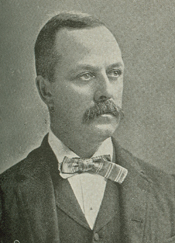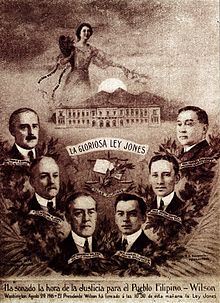
Back ჯონსის კანონი Georgian 존스 법 Korean Jones Law Dutch Закон Джонса (Филиппины) Russian Batas Jones (1916) Tagalog Luật Jones (Philippines) Vietnamese 瓊斯法案 (菲律賓) Chinese
 | |
| Long title | An Act To declare the purpose of the people of the United States as to the future political status of the people of the Philippine Islands, and to provide a more autonomous government for those islands. |
|---|---|
| Enacted by | the 64th United States Congress |
| Citations | |
| Public law | 64-240 |
| Statutes at Large | 39 Stat. 545 |
| Legislative history | |
| |
 |
|---|
|
|


The Jones Law (39 Stat. 545, also known as the Jones Act, the Philippine Autonomy Act, and the Act of Congress of August 29, 1916) was an Organic Act passed by the United States Congress. The law replaced the Philippine Organic Act of 1902 and acted as a constitution of the Philippines from its enactment until 1934, when the Tydings–McDuffie Act was passed (which in turn led eventually to the Commonwealth of the Philippines and to independence from the United States). The Jones Law created the first fully elected Philippine legislature.
The law was enacted by the 64th United States Congress on August 29, 1916, and contained the first formal and official declaration of the United States federal government's commitment to grant independence to the Philippines.[1] It was a framework for a "more autonomous government", with certain privileges reserved to the United States to protect its sovereign rights and interests, in preparation for the grant of independence by the United States. The law provides that the grant of independence would come only "as soon as a stable government can be established", which was to be determined by the United States Government itself.
The law also changed the Philippine Legislature into the Philippines' first fully elected body and therefore made it more autonomous of the U.S. government. The 1902 Philippine Organic Act provided for an elected lower house (the Philippine Assembly), while the upper house (the Philippine Commission) was appointed.[2] The Jones Law provided for both houses to be elected[2] and changed the name of the Philippine Assembly to the House of Representatives. The executive branch continued to be headed by an appointed governor general of the Philippines, always an American.
Elections were held on October 3, 1916 for the newly created Philippine Senate. Elections to the Philippine Assembly had already been held on June 6, 1916, and those elected in that election were made members of the House of Representatives by the law.
- ^ In the "Instructions of the President to the Philippine Commission Archived 2009-02-27 at the Wayback Machine" dated April 7, 1900, President William McKinley reiterated the intentions of the United States Government to establish and organize governments, essentially popular in their form, in the municipal and provincial administrative divisions of the Philippine Islands. However, there was no official mention of any declaration of Philippine Independence.
- ^ a b Philippine Autonomy Act (Jones Law)